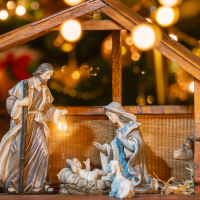Joel Osteen: The Man Behind America's Largest Church
CBN.com 700 Club reporter Kristi Watts recently visited the largest church in America to interview the man who is behind it all, Pastor Joel Osteen.
PART ONE
"I’m here in Houston, Texas in this huge arena. I’m not going to a concert or a sporting event. I’m going to church."
Welcome to Lakewood. Over 44,000 people of every race, origin, and nationality fill this old basketball arena each weekend. Turn back the hands of time to 1959. Pastor John Osteen and 90 other Christians decide to turn an old feed store into a church on the north side of Houston. Their goal was simple -- to lead people to the power and love of Jesus Christ by plowing through denominational walls. Decades later, the baton was passed on to son, Joel Osteen ... and in less than 10 years, the ministry has catapulted to worldwide recognition, drawing visitors from all over the world. Each week over seven million viewers tune in to hear a message of hope and encouragement from "the smiling pastor."
But Joel Osteen is not without his critics. Some Christians have criticized him for avoiding sin, Satan, and Hell in his sermons. Others take offense that Osteen lacks a seminary degree and accuse him of watering down the Gospel with a "Christian lite" message.
Kristi Watts: Well recently, I got together with Joel to discuss his passion, his new book, and his critics. And what I found was that the man in the pulpit is just as charming in person with his down home laugh and love for telling stories. What makes you [Joel] mad?
Joel Osteen: What makes me mad? There’s not a lot that makes me mad.
Watts: Do you want me to tell you what your wife said?
Osteen: What?
Watts: She said initially, 'When some people are late' ... and I said, 'When some people or when you're late Victoria?' And she said, 'When I’m late.'
Osteen: That could be part of it. I asked her today, 'Victoria, if I wasn’t there, what would you do?' She said, ‘I guess I’d go get another husband.'
Joel met and married his wife 20 years ago. She’s not only his best friend but his partner. We’ll meet her later on.
Watts: So how does a self-professed, shy Texas man get in front of millions of people every single Sunday? Is it nerve wracking?
Osteen: It used to be, but it’s not as much anymore. I just rely on the Lord to help me. I think He gives you grace to do what you’re called to do, but I don’t really think about it. I just think about how I’m talking to that group that’s there. I’m amazed that I’m doing it myself.
Watts: Are you still shy?
Osteen: I’m still shy. I’m still reserved. I think that’s just my personality.
Watts: This is the first time that I ever went to your church, and it is so overwhelmingly exciting. You walk in and it’s part rock concert, part sporting event.
Osteen: You know, it may feel like a rock concert or a pep rally, but there are enough things pulling us down in life. I’d like to come in and say, ‘We’re going to celebrate what God’s done for us, and we’ve all got challenges. We’ve all got reasons not to celebrate, but that’s what faith is all about. God we’re going to just celebrate who You are today.'
Watts: You’ve got 40,000 people. How are you able to meet their needs individually?
Osteen: We have a great support system. Not only our staff, but we have about 4-5,000 volunteers. And my father got us started in this in that we believe that every believer is a minister. All of us have something to do. And no one is left out, especially the children. In their state of the art facility, they don’t just have 'Children’s Church.' They have a church for the children, and it totally rocks! We knew if we could get the kids wanting to come to church, then the parents will come.
Watts: How in the world are you able to get blacks, whites, Mexicans, Asians, young, old, poor, and rich in one place?
Osteen: It’s amazing. It started way back with my father. It’s funny because people ask us all the time how we do it, and I don’t know. We never tried to … what do you call it? Integrate. It’s just my dad’s message was a message of hope and love, and it seemed like everybody came in all different races. Even when we go to different cities on the road, it’s the same thing. It just seems like it’s equally mixed and even like you said, not just races, but social economics as well. It’s just – you can have a professional ballplayer sitting by somebody that took the bus. When I look out there I think this is what Heaven’s going to be like.
Joel’s passion to bring the Gospel to everyone around the world is shared by his wife of 20 years, Victoria. I [Kristi Watts] chatted with Victoria a little bit about her role in the ministry.
Watts: The one thing I love about you and Joel is that it seems like you guys are a team. Even during the service you get up and minister about kids, children, and family. So is that where your heart is?
Victoria Osteen: Yeah, it really is. You know, it just – that comes very natural for me. It’s very easy for me to just encourage people in their family life and in their children. It’s just very natural to me. It’s what I feel comfortable doing, and so I enjoy it. Joel’s up there speaking to millions of people, but then you get up there.
Watts: Were you like, ‘Okay Lord, it’s okay if Joel does it, but do I have to go up there too?' Were you ever like that?
Victoria Osteen: Absolutely! Joel looked at me one day and I just said, ‘You know what? I don’t know if I’m called to do this.' And he looked at me one day and he said, ‘When you step up, the church will be everything it’s supposed to be. We’re a team.'
Watts: As a wife, how does that affect you when people don’t speak as kindly as you feel they should toward your husband?
Victoria Osteen: Well, you know, I guess I see so much fruit, and I see people everyday, every Sunday, who their life has been touched. It’s been changed. It’s just hard for me to put a lot of credence in that, the criticism because I think, ‘Have you ever been here? Have you ever been in a service? Have you ever talked to anybody whose life has really been touched?' So I just focus on that.
Watts: What’s the one thing that people just don’t know about Joel that you wish they did know?
Victoria Osteen: How good of a father he is and how great of a husband he is. He’s considerate. He always involves me. I mean, he always really thinks that I bring a huge value to our relationship, to our work, and to everything. I don’t know if that’s rare, I think. It’s truly a wonderful blessing for me.
PART TWO
Joel Osteen: When my father died, there was a natural tendency and pressure to do what he did. I wanted to honor my father, and I didn't want to disappoint the people of Lakewood. But I've learned this simple principle that I'm not competing against them ... all I have to do is be the best 'me' that I can be. One day when I read the Scripture about David, that he fulfilled his purpose for his generation ... I knew God spoke to me.
Watts: Your dad fulfilled the purpose for his generation. Now you go out and fulfill your purpose for your generation. What's your heart, what's the core message that you teach?
Osteen: I feel like my message is to let people know that God is a good God, that He’s on their side, and no matter what happens, He has a great plan for them.
Not only are millions drawn to his message of hope every Sunday, but he's quickly become a media darling. But even with all of the press, Joel is not without his critics. Many label his teachings as “Christian lite,” with too much "feel good," but not enough substance. But true to form, Joel responds to his critics much like he responds in the pulpit with a positive, overcoming attitude.
Osteen: I like to take everyday just searching my own heart making sure that I'm on course, and I'm doing what God wants me to do. I'm real good with not looking to the critics and looking straight ahead.
Watts: Some people want to know why you don't say the "s" word, the "d" word, or the "h" word ... sin, the Devil and Hell.
Osteen: When I grew up, the Devil was a reason why I had a headache or the Devil was the reason I got mad today. We always blamed the Devil. I think today when I say the Enemy, I like to make it broader. Sometimes the Enemy can be our own thoughts. We’ve trained ourselves the wrong way. Or the Enemy can be our own lack of discipline. Some people preach about Hell like you're already going there, and to me the Gospel means 'Good News.' I'd rather say God is a God of mercy. So I think the people already know what they’re doing wrong, and I certainly believe in Hell. But to me, when I see thousands of people before me, it just doesn’t come out of me to say, 'You guys are terrible, and you’re going to Hell.' I’d rather say that God is a God of mercy. You’ve got to live an obedient life, but for every mistake you’ve made, there’s mercy there, and I believe we can do better.
Watts: Okay, are you a prosperity teacher?
Osteen: I like to answer it with this…if prosperity means God wants us to be blessed and healthy and have good relationships then yes, I'm a prosperity teacher. But if it’s about money, no, I never preach about money. I probably stay away from it more than normal because televangelists get a bad name. People put me in that category because I do believe that God does want us to be happy, healthy, and whole.
Joel's recently written his second book, Become a Better You. It follows at the heels of his first New York Times best seller, Your Best Life Now. In his new book, he gives seven keys to improving your life. Keys like, “be positive toward yourself," “form better habits," and “stay passionate about life." He says, he likes to keep his messages simple, so he can reach a broader audience.
Osteen: I like to be broader so that the average person can understand it. I think maybe we go overboard. But sometimes we over-spiritualize things. We think when God speaks to us, there’s going to be a boom out of heaven or we’re going to get some chill bumps, but I really believe God’s talking to us all the time. He’s talking to us right in here. I call it our heart, our conscience, but it’s the Holy Spirit talking to us. I think the thing is I just like to make it as practical as I can be so when I started. The guys who I play basketball with who are not necessarily Christians, though if they can’t understand what I’m saying, then I don’t feel like I’m reaching them.
Watts: When people read this book, it's easy for people to look at it and say that God is kind of like a vending machine, if I do this, then I'll get that...
Osteen: I never think of it like that. God honors obedience, and He has distinct plans for us. I think the dreams that God puts in our hearts, we can fulfill. He’s equipped us for that. The flip side is that I like for people to expect things. And sometimes people say, 'Well Joel, God doesn’t care if you get a good parking spot or not, it’s not that it's acknowledging God in all of your ways, that’s what the Scripture says.'
Watts: Twenty years from now, where do you see yourself? It's such a resume question.
Osteen: I don't know. I would have never seen myself here 10 years ago. You would have never convinced me that we’d have this building that the Houston Rocket’s played basketball and me ministering as well. I would hope to say that we would have more influence, more credibility, more reach, and be able to help more people. Man, that’s my prayer every day. 'God let us not have a year where we go down or we get stagnant, but that we can touch more people.' [Not family wise but to make a difference.] And the key to making a difference is simple ... to lead people to a relationship with Jesus Christ.
We never like to miss an opportunity to make Jesus the Lord of our life. That's why I never like to have a service without giving an invitation or writing a book, without giving an invitation and presenting that truth. I believe this is the whole key to living your best life, living a fulfilled life or becoming a better you. I really believe it starts there if the heart is pliable, they'll receive the love that Jesus died and shed his blood for.



